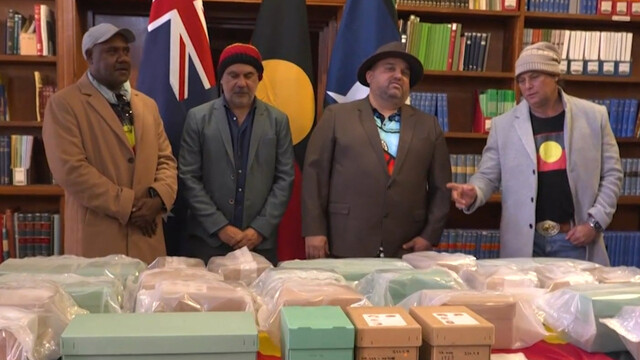
London, United Kingdom – The remains of thirty-six Indigenous Australian ancestors are set to return to their homeland, marking the latest repatriation effort to bring back ancestral remains taken from their traditional lands.
In a significant step towards reconciliation, six of these ancestors were formally handed over to representatives of their respective Queensland communities – the Woppaburra, Warrgamay, Wuthathi, and Yadhaighana peoples – during a poignant ceremony held at London's Natural History Museum on Thursday.
The Australian government has pledged to care for the remains of the remaining thirty ancestors until their traditional custodians can be identified and located.
The removal of Indigenous Australians' remains occurred over centuries following British colonization in the 18th century. These remains were often acquired by a variety of individuals, including scientists seeking to study human anatomy and anthropology, as well as explorers and colonial officials who sometimes collected them as curiosities or for purported scientific purposes. Consequently, the remains ended up scattered across the globe in museums, universities, and private collections.
However, in recent decades, growing ethical awareness and concerns surrounding the collection, trade, and public display of human remains have spurred increased efforts towards repatriation. Indigenous communities worldwide have advocated for the return of their ancestors, emphasizing the profound cultural and spiritual significance of allowing them to rest in their ancestral lands.
Thomas Holden, representing the Warrgamay community, articulated the deep impact of these removals at the ceremony, stating, "The removal of our ancestors from their resting places was an act of deep disrespect—one that severed our spiritual and cultural connections to Country." He further emphasized the broader significance of repatriation, asserting, "Repatriation is about more than just bringing our ancestors home. It is about reaffirming our sovereignty, our rights, and our deep cultural and spiritual obligations to care for our people, even in death."
This repatriation marks the fourth instance of the Natural History Museum returning ancestral remains to Australia. The museum stated that its staff had undertaken "detailed archival research," collaborating with various organizations to meticulously trace the origins of the remains in its collection. This research is crucial in identifying the correct descendant communities for each individual.
According to data from the Australian government's Office for the Arts, this latest return brings the total number of First Nations ancestors repatriated from institutions and private collections worldwide to 1,775. This figure includes over 200 sets of remains that have been returned by the Natural History Museum alone, highlighting the museum's ongoing commitment to this ethical imperative.
The Australian government also indicated that ongoing discussions are being held with other institutions and private holders of Indigenous remains within the United Kingdom regarding the "unconditional and voluntary return of further ancestors." These discussions signify a continued commitment to addressing the historical injustices faced by Indigenous Australians.
Keron Murray, a representative of the Wuthathi people, underscored the healing aspect of repatriation, stating, "The repatriation of our ancestors is a vital step in healing the wounds of the past and restoring the spiritual and cultural balance that was disrupted when they were taken from their homeland."
Wayne Blair, a renowned actor and filmmaker representing the Woppaburra people, eloquently described repatriation as "an eternal flame, the eternal healing is both spiritual and physical, for our elders and community." He powerfully reminded those present of the human element involved, stating, "You are not returning science specimens, you are returning ancestors to their families, their descendants."
The repatriation of these 36 individuals represents a significant step in acknowledging past wrongs and fostering a process of healing and reconciliation between Australia and its First Peoples. It underscores the growing global recognition of the ethical imperative to return human remains to their rightful descendants and ancestral lands, allowing for proper cultural and spiritual ceremonies to be conducted. The ongoing efforts and collaborations between Indigenous communities, governments, and institutions worldwide signify a continuing commitment to this important work.
[Copyright (c) Global Economic Times. All Rights Reserved.]






























